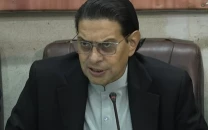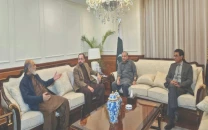The cost of harangue outside safe confines of parliament
Politicians often speak their heart out in public rather than in assembly

Lawmakers get a minimum of 130 days in a year to speak their heart out on the floor of parliament. Yet, they frequently abandon the prestigious, top constitutional forum and manage to draw courts’ ire with their reckless statements given in public places that lack immunity.
Parliament shields politicians from the outside fury to a great extent. The courts are usually reluctant to ‘foray into’ the insulated hallowed halls.
However, the lawmakers, seemingly loath to speak within the ‘safer confines’, often take matters before large gatherings to air their opinions. This has often landed them in legal troubles.
A recent report of the Pakistan Institute of Legislative Development and Transparency (PILDAT) revealed that ex-premier Imran Khan attended only one National Assembly sitting in the 4th parliamentary year while he held the office of the prime minister, adding that ex-prime minister attended a total of 34 or 11% sittings of the 15th National Assembly.
The PILDAT report states that Prime Minister Shehbaz Sharif, after taking oath as PM on April 11, 2022, has attended only eight out of 43 or only 19% of sittings of the National Assembly, where PILDAT said the cost of a working day of the 15th National Assembly stood at Rs64.15 million.
Read more: New parliamentary year: the paradox of presidential address
Abandoning parliament has proved to be a costly practice – both financially and politically – for different politicians belonging to different political parties in the past as they faced contempt of court proceedings and got disqualified.
Imran Khan’s recent speech criticising a sitting judge and the Inspector General of Police has also landed him in hot waters. Yet he – and other politicians – prefers speaking before the public than in parliament.
“Public power is the only thing that impresses the opponents as well as the power centres that be in the country,” PILDAT’s president Ahmed Bilal Mehboob said, saying speeches in the assembly provide immunity but don’t serve the actual purpose of showing the strength every now and then.
“Opponents and the centres of powers in the country are impressed by the public,” the PILDAT chief said, saying, “Imran feels why he shouldn’t use the strength that he has over others."
Mehboob said that Imran has a huge public following and people gather whenever he gives a call for a rally. From this, he said, Imran draws great strength to impress the rivals and the power centres.
Through public rallies, Mehboob said, Imran gives a message that having public support is extraordinary, and this show of strength adds weight to his message and narrative.
Also, he said that parliamentary immunity was not unlimited as the Constitution bars lawmakers from discussing the conduct of the judges of the high courts and the Supreme Court.
He referred to Article 68 of the Constitution (restriction on the discussion in Majlis-e-Shoora [Parliament]), which states that “No discussion shall take place in [Majlis-e-Shoora (Parliament)] with respect to the conduct of any Judge of the Supreme Court or of a High Court in the discharge of his duties.”
Article 69 (Courts not to inquire into proceedings of parliament) states: (1) The validity of any proceedings in Parliament shall not be called in question on the ground of any irregularity of procedure” and “(2) no officer or member of parliament in whom powers are vested by or under the Constitution for regulating procedure or the conduct of business, or for maintaining order in parliament, shall be subject to the jurisdiction of any court in respect of the exercise by him of those powers.”
Referring to massive public support for PTI, Mehboob said that power shows give strength but Imran should carefully choose words or sentences as immunity ends at parliament. He said Imran was careless in naming a sitting judge and others in a public gathering, saying he could have conveyed the message while being more careful in selecting words and sentences.
Advocate Imran Shafique said that lawmakers should keep in mind that the speeches made outside parliament have legal consequences, saying either they should carefully convey their message to the masses in the public gathering or choose the forum which gives them immunity.
Apart from judges’ conduct, the legal expert said, the lawmakers can discuss almost everything under the sun, saying they can also discuss and criticise courts’ judgements as the Constitution only puts a restriction on discussing the conduct of the higher judiciary’s judges but not their professional or legal matters. “They have the power to amend the constitution; what else they need,” he said.
Shafique, however, regretted that it was an insult to parliament that the lawmakers either do not attend the sessions or utter a single word as revealed by the recent PILDAT report.
The report said that Foreign Minister Bilawal Bhutto Zardari was the most vocal MNA during the tenure of the PTI government (three years and eight months) while 174 MNAs (50.88%) did not speak at all.
He said that the speaker has the right to restrict or expunge remarks from the speeches but still the legislators have parliamentary immunity and they can express their views with complete freedom.
He recalled that even the chief justice of Pakistan has given remarks that PTI should play its role in the parliament, saying it is time for all political parties to play their due role and strengthen parliament instead of just using it as a ladder.



















COMMENTS
Comments are moderated and generally will be posted if they are on-topic and not abusive.
For more information, please see our Comments FAQ